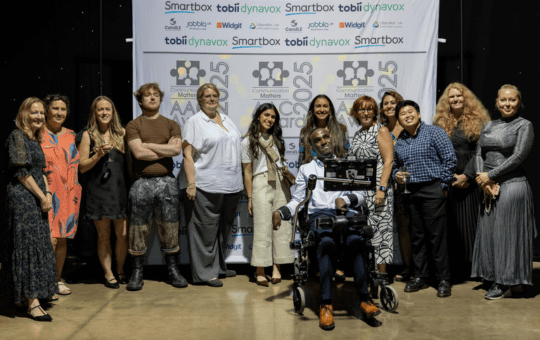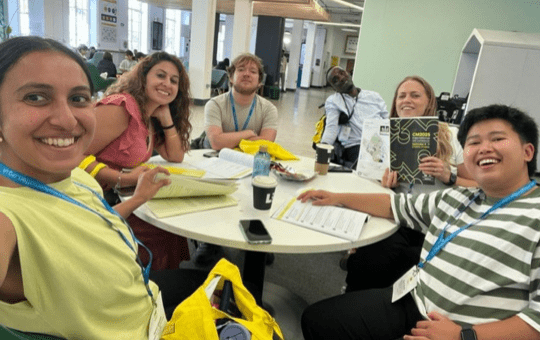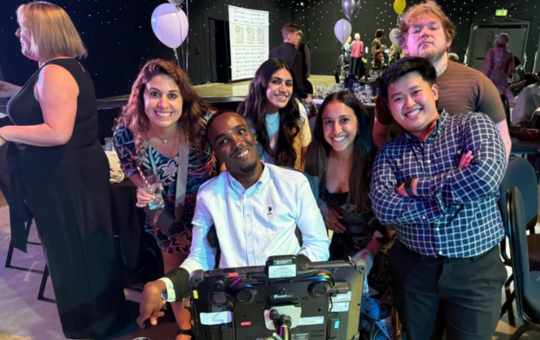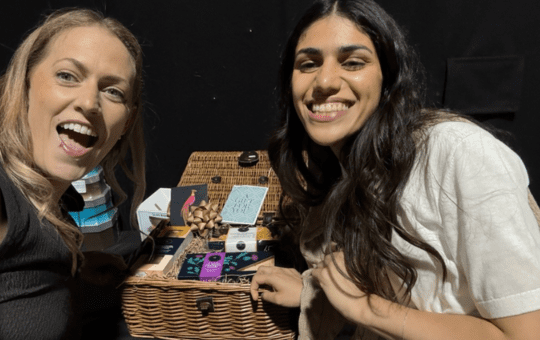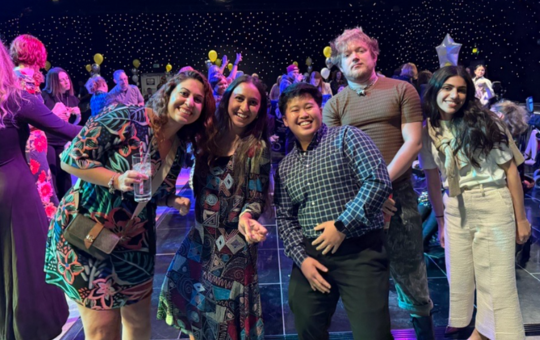Celebrating all voices at Communication Matters 2025
The annual Communication Matters International AAC Conference (CM) is an opportunity for members of the CENMAC team to take a couple of days to meet with peers from other organisations and exchange ideas and information about the latest developments in AAC. It’s also a chance for a bit of downtime and to have some fun with colleagues at the great social events.
Here are some of our team highlights:
Victoria Annan, Advisory Teacher
A celebration of voices in all their forms
This year’s CM Conference was nothing short of inspiring. With many AAC users in attendance, the event truly embodied inclusivity at every level — from the sessions to the social spaces. It felt like a celebration of voices in all their forms.
Mateo Moreno’s AAC Journey
One of my highlights was the personal story session delivered by Mateo Moreno. Mateo spoke powerfully about his AAC journey and the impact he has had in shaping his school community’s attitude towards communication. His story was moving, uplifting, and a reminder of why we are all here — to ensure every voice is heard and valued.
Alyssa Zisk’s flexible AAC
Equally impressive was Alyssa Zisk’s session on part-time AAC use. I left with a new understanding of how flexible and varied AAC use can be, and how important it is to support users in the ways that work best for them.
Make a Difference Award
The awards ceremony was a beautiful and emotional moment, recognising so many inspiring winners who are making a difference every day. While the team at CENMAC were a little disappointed not to see our colleague Abdi Omar win the Make a Difference Award, we couldn’t help but feel proud of all the incredible achievements being celebrated. The winner was Professor Janice Murray, who has devoted her life to bettering the lives of AAC users.
Hamper Winners!
On a lighter note, Team CENMAC were thrilled to win a hamper in the raffle — a very exciting moment that topped off an already brilliant event! Beyond the sessions and ceremonies, the real joy came from meeting new people. Everyone was so friendly and welcoming, making it easy to connect and share experiences.
Thank you to the CM trustees
A huge thank you must go to the Communication Matters trustees. Every detail had been thought through to make sure the conference was inclusive, accessible, and ran smoothly. Their efforts ensured that every attendee — whether an AAC user, professional, or family member — felt valued and supported.
I came away with new knowledge, fresh perspectives, and plenty of inspiration. Most importantly, I left reminded of the power of communication — in every form.
Joe Herbert – Specialist Teaching Assistant (AAC) & Trainee SaLT
AAC vs the Criminal Justice System
‘AAC users vs the Criminal Justice System: the support available and how to make sure AAC users are their own best witness’ was led by Andrea Sharples (Clinical Director, AT Therapy ) and Alison Cousins (Registered Intermediary).
The content was particularly useful for insight into the role of a Registered Intermediary in protecting the complainant in facilitating communication between themselves and various players within the legal system following an incident. The talk highlighted important statistics (or lack thereof) regarding the success of RSE interventions for youth with disabilities, difficulty mapping incidence rates due to comorbid existing stats, and the various barriers to accessing support or disclosure such as components of speech and language disorders (difficulties with narrative, word order, limited opportunity).
The talk outlined the responsibility of Registered Intermediaries and the actions they may take, such as constructing one-page profiles for a complainant or witness to minimise bias, to ensure that their AAC method is accommodated and considered throughout legal proceedings, allowing AAC users to provide their best evidence.
3D Printed Communication Symbols
I also attended ‘An introduction to 3D printed communication symbols and reflections on the journey so far’, led by Claire Harrison (CALLScotland). The talk outlined the success brought in from tactile rapid-prototyped symbols and braille tiles, using twin-filament 3D printing.
The talk highlighted the practicality and increasing feasibility of in-house design solutions, these production methods now available and accessible for teachers, SLTs, and AAC users.
The talk also covered the importance of codesign and how adaptive designs via rapid prototyping can shorten wait times and solve complex problems of access using existing free online databanks of 3D files, collated from AAC users, designers, engineers, teachers, and advocates.
Power-based AAC
Zoë Clarke (Clinical Scientist, NHS) and Tom Griffiths (Clinical Scientist, Professor, University of Dundee) are exploring how the profession functions support AAC users with powered devices.
The workshop provided insight into the scope of the role within clinical engineering as well as advice on career structure, outlining routes into the position and the competencies required to carry out their varied specialisms.
The workshop involved conversation of how clinical scientists support MDT teams and the strengths brought to AAC provision; largely around specialist evaluation and management; but also, toward specialist testing and system design that may be required for complex instances.
Sarah McPoland, Advisory SaLT and CM Trustee
Lightning Talk
I particularly enjoyed listening to insights from international delegates and interacting with Mateo Moreno following his very inspiring lightning talk “Empowered by Connection: How AAC Camps Foster Lifelong Mentorship and Community”.
The tools to enhance AAC collaboration for improved outcomes and successful transitions presented within Tina Moreno’s seminar were also extremely valuable.
What lies ahead for Minspeak Users in the UK?
Finally, the workshop “Minspeak Users in the UK – What Lies Ahead?” facilitated by Josh Mars served as a valuable opportunity for reflection and discussion which was enhanced by input from a range of stakeholders.
First time at Communication Matters
Bea Abella, Advisory Speech and Language Therapist
It’s the first time I’ve attended a CM conference and overall it was inspiring and thought-provoking. The 2-day conference provided everyone an avenue to connect as well as explore new ideas to further support the users. One of the standout sessions for me was the “Thoughtful approach to AI and AAC” by Alyssa Zisk it sparked my curiosity of the future of AAC and the considerations that need to be addressed. I left CM excited and motivated to bring some of what I learned to my own practice.”
Zahra Sheikh, Advisory SaLT
I attended the CM Conference for the first time this year and I really valued the chance to connect with the AAC community.
Two sessions stood out for me, Alyssa Zisk’s talk on part-time AAC users highlighted the flexible ways people use AAC and how important it is to support this, rather than act as a barrier.
Linguistic interventions via AAC
Catherine Martin and Hannah Blandford also presented their research on linguistic interventions for children developing language via AAC. Both presentations made me reflect on my current practice and how I can better support the people I work with.
Raffle Prize!
Lastly, I was lucky enough to win a book in the raffle! I won “Working with AAC: A Guide for Supporting Augmentative and Alternative Communication” by Helen Robinson – who also very kindly signed it for me!
We look forward to reflecting on what we learned at CM and bringing these ideas to improve on our practice.
Kathryn Stowell, Head of CENMAC
Enhancing communication with Proloquo Classroom at Charlton Park Academy
One of the final sessions of the conference was with our very own teachers at Charlton Park Academy where CENMAC is based as an outreach service. We were very proud of Amber, Emma and Claire who shared their presentation on ‘Developing a school wide AAC vocabulary as a universal AAC support (for all learners)’. They did a brilliant job of sharing how the use of the AAC app Proloquo Classroom is enhancing communication and improving access to learning for all at our Academy. After a year into a whole school approach to AAC, the school data is showing a significant increase in progress for speaking and listening, especially for those who previously were not making progress. Well done and thank you to Amber, Claire and Emma.




